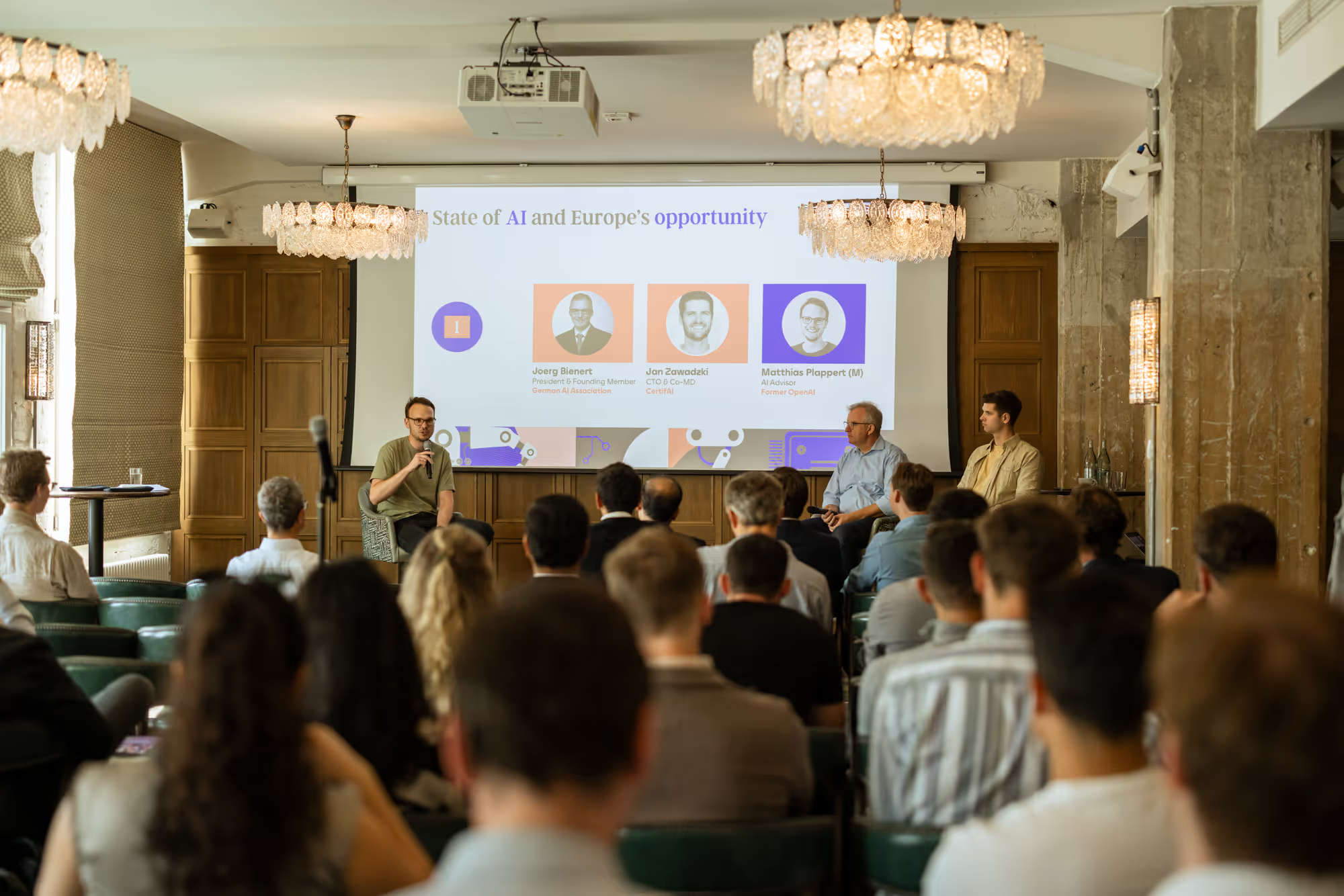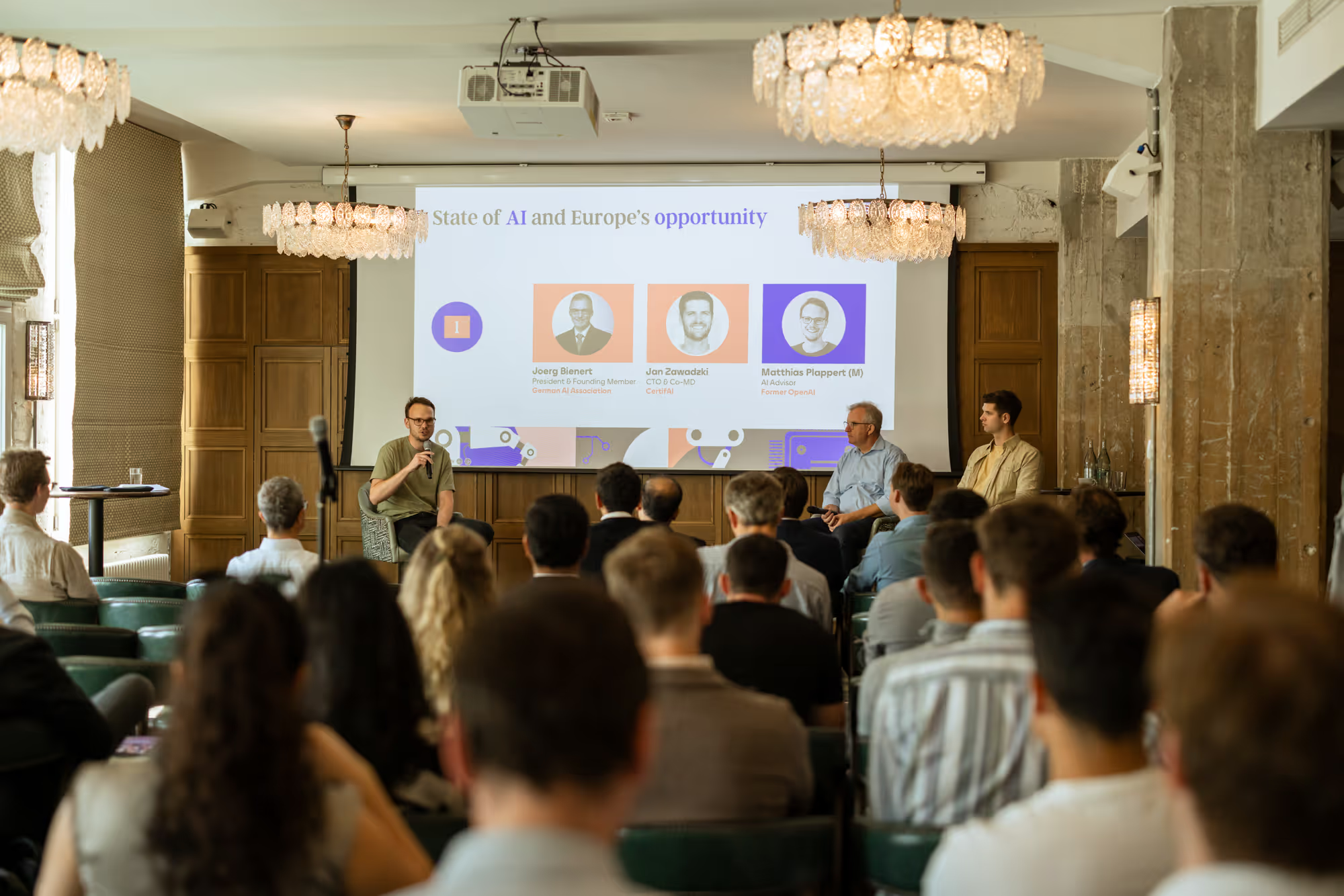Listen now
Last week in Berlin, we hosted the Future Unleashed (Un) Conference, where experts gathered to explore the intersection of Industrial Tech and AI, especially within Europe. The discussions centered around how Europe stacks up globally in the Industrial Tech space, how to drive value at scale, and what improvements are needed. In this blog, we shed some light into some of the key takeaways from the event.

1) Creating real value and ROI with industrial AI
During the event, several key insights emerged regarding the real-world value and return on investment (ROI) of industrial AI solutions. While AI and robotics are still in their early stages, panelists agreed that the demand for reliable, user-friendly solutions is rapidly increasing. The key drivers for customers to deploy industrial AI are to reduce lifecycle costs and improve productivity.
The conversation also highlighted the two points at which ROI calculations are crucial. First, aligning customer expectations at the beginning of the project is essential to ensure both parties are working toward realistic goals. "If you don't set the right expectations from the start, it’s going to cause frustration down the line," one panelist warned. The second point for ROI comes during deployment, where the models and systems initially built need to prove their value. Though the second stage is typically more challenging, it's also where scaling becomes viable. As one expert noted, "Scaling is possible when the initial ROI targets are met, but this can be a long process." In order to achieve this, companies should be prepared to enable good quality data to show the value their products are bringing.
Managing customer expectations, especially in the context of the tech hype cycle, was another recurring theme. One speaker provided an example whereby he explained how they worked with customers at different levels of the hype cycle, each requiring a tailored approach and timeline to success and why ‘having a joint framework and clear milestones is key’.
The panels also touched on the broader labor landscape, particularly in Europe, where a significant labor shortage is anticipated in the coming years. The consensus was that AI and robotics will play a critical role in plugging these gaps, rather than simply replacing human workers.
"AI isn’t about replacing jobs - it's about augmenting the workforce and addressing structural issues."
2) Building vertically integrated solutions for scale
Scaling AI in industrial settings presents a unique set of challenges, particularly when it comes to vertical integration. One of the key considerations, according to the panelists, is determining what to develop internally versus those that should be outsourced. This involves keeping a balance between leveraging off-the-shelf components and building custom hardware. The success of vertical integration hinges on a clear understanding of what truly adds value for customers. Accordingly, having a customer-centric focus is critical when it comes to the strategic decisions regarding company building.
With vertically integrated solutions, building a proof of concept is often straightforward, but to scale that solution requires a more refined approach. As one speaker put it, "You need to industrialize your system"—which means appreciating the importance of quality management systems, engineering rigor, and safety, as well as other critical factors that matter when moving beyond the initial sales.
Moreover, as the landscape continues to evolve, we are likely to see more vertically integrated applications aimed at massive, existing markets. In these markets, the solutions are often complex, requiring a deep integration across different systems and disciplines. This complexity, however, also brings the potential for high rewards by addressing broader industrial challenges with more scalable AI solutions.
Lastly, it was pointed out that scaling AI goes beyond the technical side—it’s just as much about organizational culture. Getting internal buy-in and working with "champions" within organizations can make all the difference.
3) Europe’s AI opportunity and market challenges
Some of the panel discussions also focused on Europe's AI landscape, highlighting both its strengths and challenges. Despite having a strong talent pool, particularly in countries like Germany, Europe faces difficulties in scaling AI businesses compared to the U.S. due to risk-averse investments and challenges in securing large seed funding, particularly for advanced projects like large language models (LLMs). The impact of AI regulations, such as the EU AI Act, was also discussed, with concerns that overly strict regulations might stifle innovation and competitiveness. However, it was suggested that “Europe could excel by focusing on niche AI areas such as manufacturing”. Additionally, the slow adoption of AI, especially among small and medium-sized businesses (SMBs), was noted, with only 12% of German companies currently utilizing AI. The discussion emphasized the need for simplified legal and tax processes that could accelerate AI adoption and bolster Europe's position.
"Europe could excel by focusing on niche AI areas such as manufacturing."
The Path Forward in Industrial AI
The Future Unleashed (Un) Conference made it clear that industrial AI is on the cusp of transforming industries, but success requires careful strategy and execution.
----
At NGP, we continue to be excited about Industrial Tech and its impact, having invested in companies like ANYbotics, Daedalus, GrayMatter Robotics, Scandit, Shippeo, Spacefill, and SVT Robotics. If you’re a founder building in this space, or an enterprise customer exploring new solutions for your business, reach out to our Industrial Tech investment team, Christian, Jacob, Lyydia, and Debjit if you're based the U.S.

.svg)






.svg)






